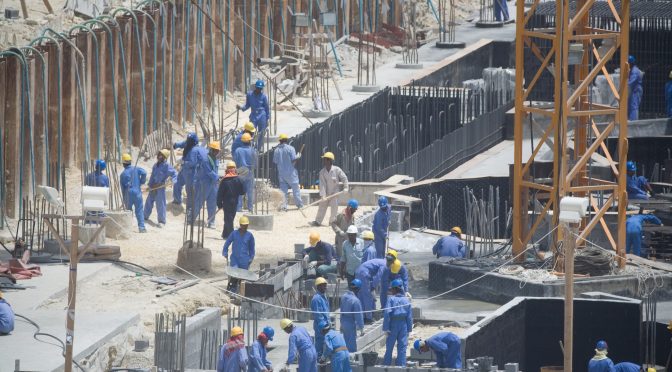A weekly round up of articles about employment, the labour market, skills training and workforce development. This week’s round up is drawn from The Daily Star. Here is the news for the week ending 9th June 2016.
This week in the Bangladesh English Press…
…despite the drop in oil prices and revenue for oil producing countries, Bangladesh still hopes to send another one million labourers to Saudi Arabia and Malaysia. But activists demand a reduction in migration cost for workers. The World Bank approves a $213 million loan to reduce poverty. Creating new jobs remains a challenge for government. And the International Labour Organization’s “Start & Improve Your Business” program focuses on small businesses to create employment.
Saudi Arabia and Malaysia to recruit another more Bangladeshis workers
Saudi Arabia wants to recruit some 500,000 Bangladeshis to meet demand in various sectors. The kingdom now has over 2 million Bangladeshis, making it the largest destination for Bangladeshi manpower.
But it’s not just about construction labourers; doctors, teachers and engineers from Bangladesh will also be considered. Both countries agreed to reduce the role of middlemen and are starting an online registration for workers.
Over the next five years half a million workers will be sent to Malaysia, says the Finance Minister. But with recruitment to Malaysia suspended for the last six months, experts and business leaders are skeptical .
Demand to reduce cost of labour migration
Bangladeshi workers pay nine times more to migrate to Kuwait compared to Sri Lankans says the Refugee and Migratory Movements Research Unit.
At a pubic hearing organised by the Unit participants requested the government take effective measures to reduce economic and social costs of labour migration.
Upgrade for National University teachers
The World Bank approved a loan of $213 million for two projects.
The first donor-supported intervention in college education will use a $100 million loan from the development bank. Eight thousand college teachers and managers at National University will be trained and students will benefit from improved teaching and administration.
In the other project the Bank will lend $113m to help Bangladesh provide reliable weather, water and climate forecasts. At least 300,000 farmers in 487 upazilas will benefit from tailored weather and climate information.
New jobs stay elusive
Employment generation will be a challenge for the government in the next fiscal year. Employment generation various sectors is a key element for attaining the targeted 7.2 percent GDP growth in the coming fiscal year. But no elaborate plan is in place on how to accelerate sector-wise employment generation, especially focusing on the youth group. According to Bangladesh Bureau of Statistics (BBS) Labour Force Survey, the unemployment rate stood at 4.3 percent at the end of September last year.
The economic growth, since 2013, has generated only 3 lakh jobs per year as oppose to 13.6 lakh per year during 2002-2013 (in accordance with BBS survey). Tk 100 crore fund for skilled human resource development from last year is yet to be used. The minister, however, promised the fund will be utilised from the next fiscal year. According to BBS, private sector investment came down to 21.78 percent in this fiscal year, from 22.07 percent in the last fiscal year.
Under this circumstances budgetary measures to accelerate the implementation of transformational infrastructure and energy projects, better management of public workfare programmes in social protection and policy reforms to rejuvenate private investments is crucial to boost employment generation both directly and indirectly.
ILO introduces program to develop entrepreneurship
The ILO introduced a program called “Start & Improve Your Business” or SIYB, a management-training effort in Bangladesh last year. Its focus is on starting and improving small businesses as a strategy for creating more and better employment in developing economies and economies in transition. Under this program, 16 trainers have already been trained to create a pool of trainers in Bangladesh, who in turn have trained 200 beneficiaries, more than 80 percent of whom are women. In terms of job creation, 30 percent of the trainees have gone on to start their business, which in turn created three jobs on average. The ILO country office plans to add another 200 beneficiaries this year. The program also plans to make conscious effort to ensure that women have access to quality support and the required skills. The ILO is working with the government and the private sector to develop an entrepreneurship development strategy for Bangladesh.
And thats the news from the Daily Star for the week ending 9th June.
